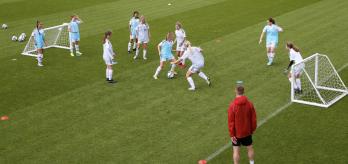Warm-up: Tag game warm-up
Organisation
- Players sit in pairs. One starts as the tagger and chases his/her partner, who is only safe when he/she sits down beside another pair. Then one player from that pair has to be chased and if caught, he/she becomes the tagger
- Use the pairs on the floor as barriers to run behind or around to escape the tagger
- You can vary the running or movement styles
Ways to make the exercise easier
- Taggers have to run with a ball in their hands
Ways to make the exercise harder
- Players have to carry or dribble a ball and change balls when they swap with the next player
Great questions to ask the children
- Can you show me how to change direction quickly?
- Can you escape the tagger by being clever?
- Can you show me another way of moving instead of running?
Safety tips
- Make sure that players on the floor sit still so that the runners do not trip over them
- Create a safe playing area
Skill development: Passing and scoring
Organisation
- Two teams of four or five players play against each other and each team defends two goals that are opposite each other and attacks two goals that are opposite each other
- Play normal football rules, but encourage players to spread out and spot where there is space to score a goal
- If you have odd numbers, you can play uneven teams or have a floating goalkeeper, or rest one player every minute
Ways to make the exercise easier
- One team can have more players in the middle
- Make the goals bigger
Ways to make the exercise harder
- One team plays with fewer players
- Make the pitch bigger
- Make the goals smaller
Great questions to ask the children
- Can you try to spread out as a team?
- Can you communicate as a team?
- Can each member of your team score a goal to win the match?
Safety tips
- Create a safe playing area
Game application: Small-sided game – Passing and scoring
Organisation
- Two teams of four or five players play against each other and each team defends its own goal as well as the goal line beside the goal
- Play normal football rules and teams get three points for scoring in the goal or one point for stopping the ball on the opponent’s goal line.
- If you have odd numbers, you can play uneven teams, rest one player every minute or ask the odd player to be the referee and change them every few minutes
Ways to make the exercise easier
- One team can have more players in the middle
- Make the goals bigger
Ways to make the exercise harder
- One team plays with fewer players
- Make the pitch bigger
- Make the goals smaller
Great questions to ask the children
- What is the best way to win the game?
- What helps you to decide whether to attack the central goal or try to get a point from stopping the ball on the goal line?
- Can each member of your team score a three-point or one-point “goal” to win the match?
Safety tips
- Create a safe playing area

















